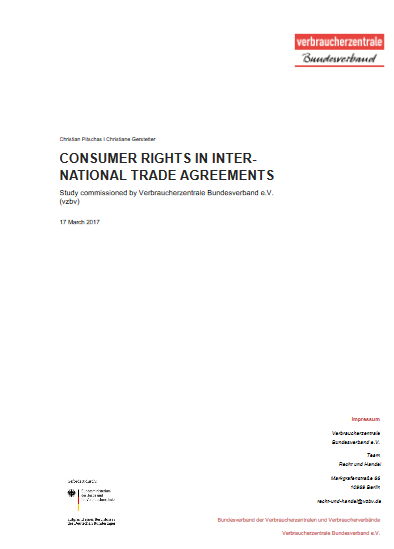The Enforcement of Consumer Rights in Trade Agreements
- Publication
- Citation
Christiane Gerstetter and Lena Donat 2017: The Enforcement of Consumer Rights in Trade Agreements. Verbraucherzentrale Bundesverband: Berlin.
Cross-border trade and the rules governing it impact consumers. Trade has benefits for consumers, such as access to goods not available domestically. Yet it also has certain risks, such as exposure to traded goods that may be dangerous. Against this background, consumer organisations on both sides of the Atlantic have been discussing what a consumer-friendly trade policy could look like. Contributing to this debate, Christiane Gerstetter and Lena Donat of Ecologic Institute's Legal Team have compiled a study examining what complaint mechanisms for consumer organisations concerning international trade agreements could look like. The study was compiled on behalf of Verbraucherzentrale Bundesverband, the federation of German consumer organisations.
The degree of effectiveness of consumer-related provisions in trade agreements depends, among others, on the availability of enforcement mechanisms. Currently, there do not appear to be any adjudicative complaint procedures that consumer organisations could make use of when consumer-related provisions in a trade agreement are violated by one of the parties. More generally, however, international law does contain mechanisms allowing individuals, companies or civil society organisations to complain about a state party to an international agreement that allegedly violates the agreement.
The study reviews five existing mechanisms with a view to producing lessons learnt for the field of consumer protection:
- the complaint procedure under the North American Agreement on Environmental Cooperation (NAAEC)
- the possibility for non-state actor to submit amicus curiae briefs in dispute settlement proceeding before the World Trade Organisation
- the complaint procedure of the International Labour Organisation in the area of freedom of association of workers
- the complaint procedure of the International Convenant on Economic, Social and Cultural Rights
- the EU's Trade Barrier Regulation, which allows companies or company associations to request the European Commission to investigate trade barriers with an effect on the EU's internal market or export markets of EU companies
On this basis, the study makes several recommendations concerning consumer-related complaint mechanisms in trade agreements.




